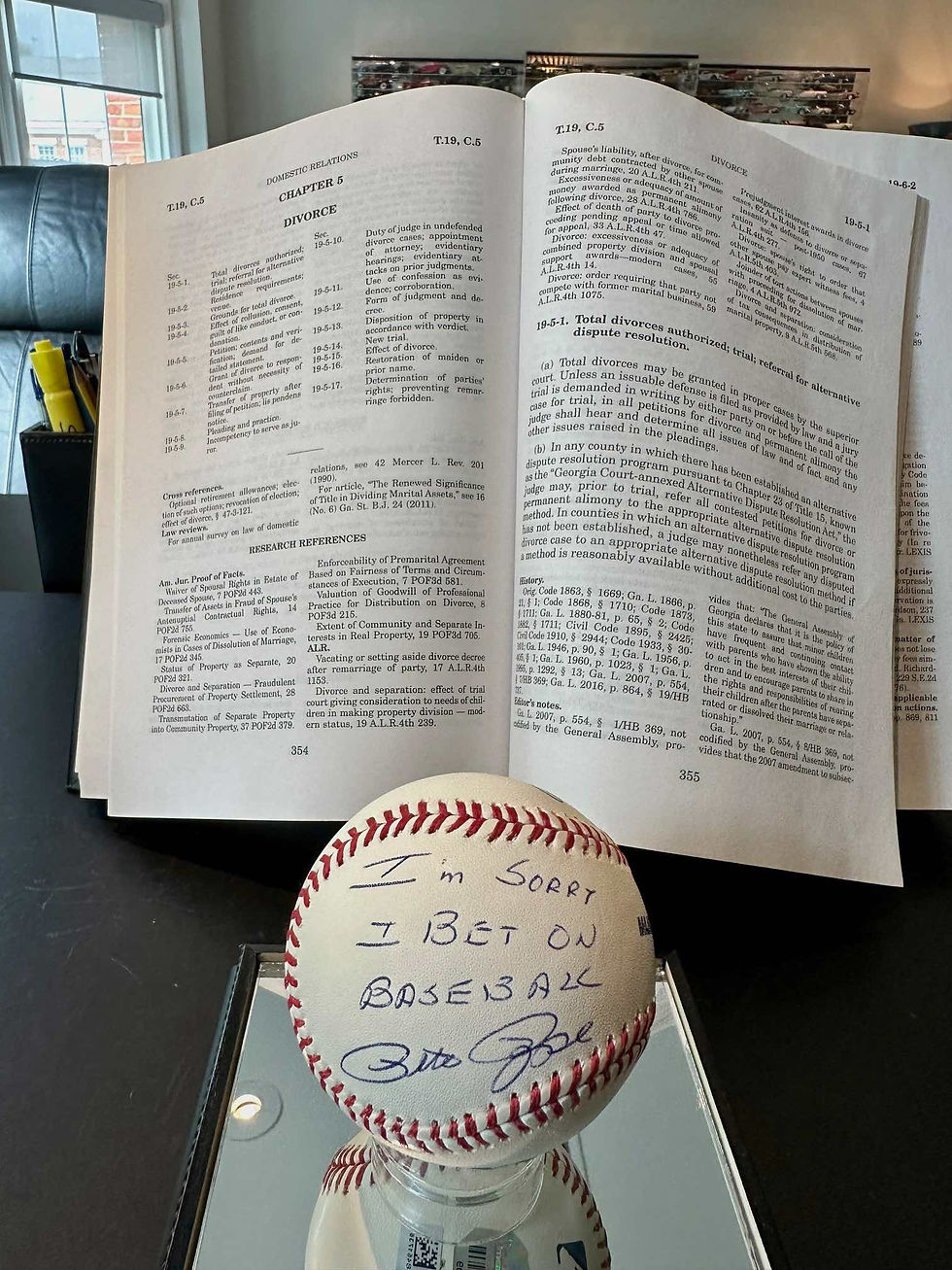Pete Rose and the Role of Apology in Family Law
- Bruce Steinfeld

- Aug 19, 2025
- 3 min read
I’ve been a baseball fan my whole life. I started as a Yankee fan growing up in New York, but after moving to Atlanta 40 years ago, I evolved into a Braves fan. I have never, however, been a Cincinnati Reds fan. So why do I have a baseball signed by Pete Rose displayed in my law office? Because on that ball, above his signature, Rose wrote: “I’m sorry I bet on baseball”. Let me explain.

For those of you who aren’t baseball fans, Pete Rose, a/k/a “Charlie Hustle”, was a Major League Baseball player from 1963-1986. He is MLB’s all-time leader in hits (4,256), games played (3,562), at-bats (14,053), and singles (3,215). He won three World Series championships, three batting titles, one Most Valuable Player Award, two Gold Glove Awards, and the Rookie of the Year Award. Rose was one of the greatest players in baseball history, and he was a shoo-in for induction in Baseball’s Hall of Fame. But in 1989, Rose was “permanently banned” from MLB amid accusations that he gambled on baseball games in which he played and managed with the Reds. For years, Rose vehemently denied these accusations. But in 2004, he finally admitted the allegations were true, and he apologized. But Rose remained banned from baseball until his death in 2024. In 2025, Rose was posthumously reinstated by MLB and became eligible for the Hall of Fame. Rose will likely be posthumously inducted into the Hall of Fame. But the fact that Rose died without knowing that he will, in all likelihood, be admitted into the Hall of Fame strikes me as something akin to a Shakespearean tragedy. I think MLB should have accepted Rose’s apology while he was still alive; like a priest administering the last rights to a dying man, it would have provided Rose with an offer of forgiveness for his sins, so he could die in peace, knowing that his life’s ambition had been fulfilled. Maybe if Rose had apologized sooner, the ban would have been lifted sooner, and he would have been admitted into the Hall of Fame while he was still alive.
As a Family Lawyer, I meet my clients at one of the lowest points in their lives. They’re anxious and depressed. They’ve been betrayed, lied to, rejected, attacked, blamed, and vilified. They’re often angry, frightened, sad, and grieving, all at the same time. They grieve the loss of the life they’d planned and hoped for, while being terrified by the uncertainty of what lies ahead. Those emotions are exacerbated by the realization that the person who hurt them so grievously is the same person who promised to love them unconditionally for the rest of their lives.
It is in that context that I discuss the role of apology and the power of forgiveness with my clients. I do not do this all the time! Every case is different, and in some cases, this approach could be counterproductive. But if my client has hurt the opposing party, I often counsel them to offer a sincere apology. First of all, that’s just the right thing to do when you hurt someone. Saying “I’m sorry” is one of the things we learn as children but often forget as adults. (See Robert Fulghum’s All I Really Need to Know I Learned in Kindergarten.) But if my client apologizes, it may be healing for the opposing party and may lay the groundwork for settlement. It may also relieve my client’s sense of guilt, if they’re empathetic enough to feel guilt. Also, if my client is the aggrieved party, I sometimes ask my opposing counsel to discuss with their client the idea of apologizing to my client. I also discuss with my clients – when appropriate – the power of forgiveness. I think this is particularly important when children are involved, because apology and forgiveness facilitate healthy co-parenting relationships.
In some disputes, including Family Law cases, apology is a powerful means of moving the parties closer to settlement. For a lawyer, advising his or her client to apologize may seem counterintuitive, and even dangerous. (“Am I committing legal malpractice by advising my client to make an admission against interest?”) Interestingly, the Georgia Legislature has provided protection to apologizing health care providers in medical malpractice cases. (See O.C.G.A. §24-4-416(b)). Maybe the Georgia General Assembly should consider enacting similar legislation in the area of Domestic Relations, to protect apologizing soon-to-be ex-spouses. In the meantime, we can at least remind our clients of what they learned in kindergarten. And, for my part, I’ll keep showing my clients that baseball and telling them the cautionary tale of Pete Rose and his belated apology.





Comments